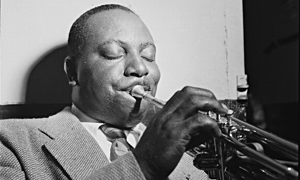Home » Jazz Articles » Book Review » Wail: The Life of Bud Powell by Peter Pullman
Wail: The Life of Bud Powell by Peter Pullman
 Wail: The Life of Bud Powell
Wail: The Life of Bud Powell Peter Pullman
483 Pages
ISBN-13: # 978-0985141813 (print)
ASIN: B0079NR9IC (ebook)
Peter Pullman, LLC
2012
The best biographies are well researched and annotated without being pedantic, informative without browbeating the reader and objective without indifference, or worse, malice. There exists excellent examples to illustrate the difference between "good" and "bad" biographies, written on the same subject: Elvis Presley. Peter Guralnick produced a two-volume set on Presley, Last Train to Memphis: The Rise of Elvis Presley (Little Brown, 1995) and Careless Love: The Unmaking of Elvis Presley (Little Brown, 1999). These books are the gold standard for Presley biographies, carefully researched and meticulously annotated and universally praised as a landmark in music reportage with Gerald Marzorati of the New York Times saying,
"[It] is not simply the finest rock-and-roll biography ever written. It must be ranked among the most ambitious and crucial biographical undertakings yet devoted to a major American figure of the second half of the 20th century....
... Ambitious? Ambitious like Robert Caro's exhaustively researched biography of Lyndon Baines Johnson, the first two volumes of which have yet to bring the 36th President of the United States to the door of the White House? Crucial? Crucial like Taylor Branch's two-thirds completed and already majestic chronicle of Martin Luther King Jr., probably the man of his time most essential to the nation's unfolding history?"
On the other end of the spectrum is Albert Goldman's lacerating and corrosive Elvis (McGraw-Hill, 1984) and Elvis: The Last 24 Hours (St. Martins, 1990) of which noted Presley expert Greil Marcus wrote,
"The real significance of Goldman's Elvis is in its attempt at cultural genocide...It [was] Goldman's purpose to entirely discredit Elvis Presley, the culture that produced him, and the culture he helped create—to altogether dismiss and condemn, in other words, not just Elvis Presley, but the white working-class South from which he came and the pop world that emerged in his wake."
Goldman's Elvis books were merely lurid voyeurism intended to besmirch and malign deeply while making as much money as possible. For his part, rock critic Robert Christgau remarked of Goldman, "[It's] Too bad, in a way, that he's not important enough to merit his own biography."
Indeed, because karma is a reliably harsh mistress with a long memory.
It has become stylish to stir into biographies elements of higher social or academic significance. Pianist Bud Powell, the leading exponent of jazz piano, has proven to be a life study providing any number of social and cultural vectors to consider with his tragically desperate story. Peter Pullman's exhaustive and satisfying Wail: The Life of Bud Powell is one such book that draws into the cross-hairs the discrimination against and marginalization of African- American musicians in New York City during the deceleration of swing and acceleration of "modern jazz," AKA "bebop." Before the story even begins, Pullman establishes his opposition to labels like "black" and "white" by broadening the descriptives African- American and European-Americans and shortening these terms to afram and euram respectively. By doing so, he renders neutral the hot thorn of race in his discussion without avoiding the subject.
Against the backdrop of Powell's biography, Pullman illuminates those dark recesses of prejudice and its applications in a dismal variety forms. Pullman discusses, at length, the cabaret card as an indiscriminate tool of discrimination, used to deprive Billie Holiday, Charlie Parker, Thelonious Monk...and Powell from plying their trade in the center of the jazz universe: New York City. He attacks directly the anti-benevolence of affluent eurams ostensibly "representing" afram artists while exploiting them financially and socially, particularly those artists with a diminished capacity, of which Powell was a poster example (this practice ran rampant during the blues revival of the late 1950s-early '60s). But Pullman saves his greatest indictment is of capricious mental health system whose incestuous relationship with legal and managerial elements provided a socially-engineered hegemony that could only be compared to the morality of the 40-year Tuskegee Syphilis Study.
Pullman makes his case in a calm and analytical manner that is all light with no heat. His arguments are hermetic and his condemnation powerfully applied by his exacting way of telling Powell's sordid story. He places Powell's life arc and associations into a stark relief. He adds a much needed context to Powell's relationship with his last significant benefactor, Francis Paudras, whose Dance of the Infidels: A Portrait of Bub Powell (Da Capo Press, 1997), was the first, albeit necessarily subjective, treatment of Powell.
Pullman details unflinchingly Powell's piano brilliance and his distracting antisocial behavior, with a sharp clinical eye. Pullman's immediate command of Powell's recordings and content are impressive and all-inclusive. His detailed descriptions of Powell's odd behaviors and the "treatment" that resulted, lead one to wonder if Powell would not have been classified as a high-functioning autistic by today's diagnostic standards (the autism spectrum was yet to be defined at the time of Powell's death).
Powell's opaque clinical cause-of-death could easily be equated to Alzheimer's disease victims who die of "nothing ever in particular." In the case of Powell, "neglect" is often cited as a contributing factor. That neglect was universal and complete in Powell's life. Everyone and everything failed Bud Powell in his life. Greater even than in the heroin-addicted Charlie Parker is the artistic triumph of Bud Powell in the face of not just chemical dependency, but substantial mental illness, mistreatment and, ultimately in the end, neglect, disregard and indifference.
What we are left with is a mountain of sublimity in Powell's music and a damning tale of America's not so distant past, laid out in naked and editorialized detail by an engaged author not satisfied with the story of Bud Powell as told so far.
This book may be purchased directly from www.BudPowellBio.com.
Tags
Bud Powell
Book Reviews
C. Michael Bailey
United States
Billie Holiday
Charlie Parker
Thelonious Monk
PREVIOUS / NEXT
Support All About Jazz
 All About Jazz has been a pillar of jazz since 1995, championing it as an art form and, more importantly, supporting the musicians who make it. Our enduring commitment has made "AAJ" one of the most culturally important websites of its kind, read by hundreds of thousands of fans, musicians and industry figures every month.
All About Jazz has been a pillar of jazz since 1995, championing it as an art form and, more importantly, supporting the musicians who make it. Our enduring commitment has made "AAJ" one of the most culturally important websites of its kind, read by hundreds of thousands of fans, musicians and industry figures every month.

























